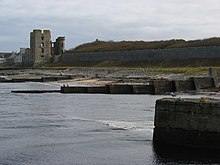Sir John Sinclair, 1st Baronet
Sinclair established at Edinburgh a society for the improvement of British wool, and was mainly instrumental in the creation of the Board of Agriculture, of which he was the first president.[citation needed] His reputation as a financier and economist had been established by the publication, in 1784, of his History of the Public Revenue of the British Empire; in 1793 widespread ruin was prevented by the adoption of his plan for the issue of Exchequer Bills; and it was on his advice that, in 1797, Pitt issued the "loyalty loan" of 18 millions for the prosecution of the war.His eldest son, Sir George Sinclair, 2nd Baronet (1790–1868), was a writer and a Member of Parliament, representing Caithness at intervals from 1811 until 1841, and married Lady Catherine Camilla Tollemache.But in the course of a very extensive tour through the northern parts of Europe, which I happened to take in 1786, I found that in Germany they were engaged in a species of political enquiry to which they had given the name "statistics," and though I apply a different meaning to that word—for by "statistical" is meant in Germany an inquiry for the purposes of ascertaining the political strength of a country or questions respecting matters of state—whereas the idea I annex to the term is an inquiry into the state of a country, for the purpose of ascertaining the quantum of happiness enjoyed by its inhabitants, and the means of its future improvement; but as I thought that a new word might attract more public attention, I resolved on adopting it, and I hope it is now completely naturalised and incorporated with our language."Sinclair was a proponent of new agricultural methods, and large tracts of land on his Caithness estate were let out to tenants who kept new breeds of livestock such as Cheviot sheep.This plan meant evicting the sitting tenants and giving them smaller plots of land to work, often in harsh coastal areas such as Badbea.In the same year he presented a paper on agriculture to the British Association for the Advancement of Science, but this was found to lack "facts which can be stated numerically."

The Right HonourableHenry RaeburnBritish ParliamentCaithnessLostwithielPetersfieldThurso CastleNew Town, EdinburghGeorgeWilliamCatherineAlma materEdinburghGlasgowTrinity College, OxfordStatistical Accounts of ScotlandColonelstatisticsEnglish languageUlbsterearls of CaithnessHigh SchoolLincoln's InnLondonFaculty of AdvocatesEnglish barHouse of CommonsCaithness constituencyBoard of AgricultureAfrican AssociationHighland Fencible CorpsIrish Rebellion of 1798Exchequer BillsCharlotte SquareBute Houseslave plantationsSaint VincentslavesParliamentBritish EmpireSlavery Abolition Act 1833Slave Compensation Act 1837Edinburgh's New TownHolyrood AbbeybaronetAlexander Macdonald, 1st Baron MacdonaldSir George Sinclair, 2nd BaronetMember of ParliamentSir John George Tollemache Sinclair, 3rd BaronetArchdeacon of MiddlesexPrebendaryChichesterWilliam MacDonald SinclairArchdeacon of LondonCatherine SinclairStatistical Account of ScotlandMinistersparishesCheviot sheepBadbeacontinentalRoyal Society of LondonRoyal Society of EdinburghAntiquarian Society of LondonRoyal Highland and Agricultural Society of ScotlandHighland Society of LondonRoyal Swedish Academy of SciencesAmerican Academy of Arts and SciencesPitt'sprivy councilCommissioner of exciseRoyal Statistical SocietyBritish Association for the Advancement of SciencearchaeologicalScotlandCatto Long BarrowAberdeenshireO'Byrne, William R.A Naval Biographical DictionaryR. MitchisonRosalind MitchisonOxford University Presspublic domainChisholm, HughEncyclopædia BritannicaNational Portrait Gallery, LondonHansardWikisourceParliament of Great BritainJames StuartButeshireGeorge JohnstoneViscount MaldenViscount ValletortReginald Pole-CarewFrederick StuartHylton JolliffeWilliam JolliffeParliament of the United KingdomWilliam BestJames Stuart-Wortley-MackenzieGeorge SinclairBaronetage of Great Britain